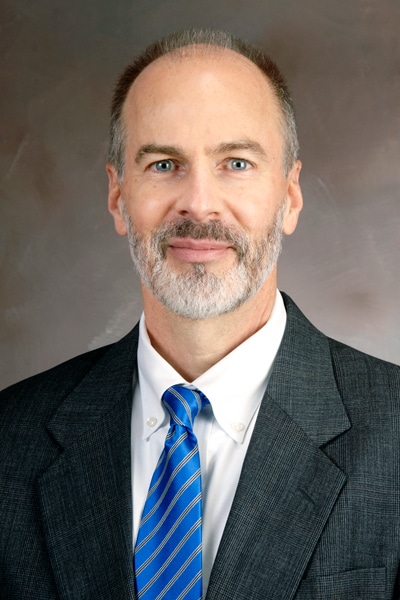When Daniel Reat looks out his office window, he sees hospitals, medical clinics, research facilities, university buildings, and business offices comprising billions of dollars in real estate and an indispensable value in healthcare services. “It’s mind-boggling,” says Reat, vice president and chief legal officer (CLO), operations and business affairs for The University of Texas (UT) Health Science Center at Houston.
It’s also a major job for a CLO. Reat doesn’t have to do it alone, though. He shares the position with Melissa K. Pifko, who handles healthcare and clinical affairs while Reat focuses on operations and business affairs. It’s a tag team approach that lets each of them work to their strengths while collaborating to provide strategic direction for UTHealth, the most comprehensive academic health center in the UT System and the US Gulf Coast region.

UTHealth is home to schools of biomedical informatics, biomedical sciences, dentistry, nursing, public health, and the John P. and Kathrine G. McGovern Medical School. This is in addition to the UTHealth Harris County Psychiatric Center and a number of growing clinical practices operated by UT Physicians, the clinical arm of the medical school. UT Physicians has roughly one hundred clinics in Houston and the surrounding communities. UTHealth also has its own teaching hospitals: Memorial Hermann-Texas Medical Center, Children’s Memorial Hermann Hospital, and Harris Health Lyndon B. Johnson Hospital.
It’s a lot of responsibility, and that especially appeals to Reat. “To me, healthcare is an incredibly broad field,” he says. “It involves everything from insurance to research, from patient care to real estate. There is a huge breadth to it, and I am still getting my arms around it all.”
Reat came to UTHealth with a wealth of legal experience in contract and corporate law and real estate, but he was relatively inexperienced in healthcare. Houston born-and-bred, he earned his JD from the University of Houston Law Center after getting his undergraduate degree from Rice University and working for IBM as an account administrator for three years to pay off student loans and take a break from school. “I had wanted to go to law school since high school, and after three years of working, I thought I better do it now,” he says. “Having worked and having received a feel for real life was helpful for me. And I was always more attracted to words, to reading and writing and logic. To a certain extent, I like debating issues or, at least, discussing things.”
His favorite legal courses were contracts and real estate, and he worked in those fields for nearly twenty years at various companies. In 2009, he joined UTHealth as a senior legal officer, where he stayed until 2013. After a three-year period at the University of Texas MD Anderson Cancer Center, he returned to UTHealth in April 2016 as interim CLO and became co-CLO in December 2016. The co-CLO idea was borne out of the idea that a new joint leadership approach would leverage the expertise and versatility of two experienced legal practitioners as co-lead counsels and allow UTHealth to best respond to the rapidly evolving environment in academic healthcare. “This fit in well with my experience because I didn’t have any hardcore clinical, health experience,” Reat says. “It also worked out fine because there is so much work. There is not a day when I am not inundated with a wide variety of work.”
Reat and Pifko work collaboratively with academic and administrative leadership, faculty, and staff at UTHealth, as well as the Office of General Counsel at UT System, the State of Texas Office of the Attorney General, and others to provide appropriate legal advice and counsel, develop strategic plans, and negotiate agreements, among other duties. The work is split relatively evenly, Reat says, and there are some shared areas, such as research, risk management, compliance, ethics, communications, and public relations that are divided up depending on whether it is more related to clinical work or the business side of the institution.
As the CLO overseeing UTHealth’s business, operational, and infrastructure aspects, Reat is responsible for faculty affairs and employment, general contracts and procurement, intellectual property (IP) and technology commercialization, information technology and information security, institutional policies, facilities and construction, real estate, and environmental health and safety. On average, he says, about half his time is devoted to managing the work or attending meetings, while the other half is spent doing the work himself, though the balance can vary wildly.
“With real estate, there is always some activity going,” he says. The activity will ramp up again soon, as UTHealth undertakes a large development project to expand its psychiatric services. On the technology front, IP and IT security are taking up a significant portion of his time. The scope of work that he and Pifko handle demands strong collaboration to devise the most effective legal strategies for the organization and their department, which includes six other attorneys and four support staff. “We have some sort of meeting almost every day—not necessarily a planned one—to talk about budgets, personnel issues, long-term projects, policy, and procedures,” he says. “At least once a day, Pifko walks down to my office or I walk down to her office to discuss various issues.”
Pifko says their collaboration has worked well, especially given that she is new to UTHealth. “He is familiar with the requirements imposed on state institutions, so he has provided me with insights in my role that would be harder to learn if there were not two CLOs,” she says. “And because he was interim CLO for nearly a year before I arrived and he worked in the UTHealth office of legal affairs for several years before that, he is able to use his existing relationships with all of the players and his institutional knowledge effectively.”
Helping lead UTHealth through these challenging times is not easy, though. “Healthcare is changing and reimbursements are changing, which has effects on funding and budgeting, so there is a lot of change right now,” Reat says. “Who knows where the healthcare environment and our institution will be in two, three, or four years? But that’s fascinating, and it’s pretty cool to be part of it.”
Photo: UT Health


